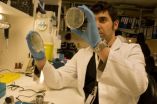(Press-News.org) We're often told to "forgive and forget" the wrongs that we suffer – it turns out that there may be some scientific truth behind the common saying. A study from researchers at the University of St. Andrews in Scotland shows that the details of a transgression are more susceptible to forgetting when that transgression has been forgiven.
The findings are published in Psychological Science, a journal of the Association for Psychological Science.
"It is well established that learning to forgive others can have positive benefits for an individual's physical and mental health," says Saima Noreen, lead author of the study. "The ability to forget upsetting memories may provide an effective coping strategy that enables people to move on with their lives."
From the perspective of cognitive science, overcoming strong negative emotions toward the person who did us wrong and quashing impulses for retribution or vengeance -- processes that are critical to forgiveness -- may be seen as a function of executive control.
And research suggests that this executive control is also involved in our ability to forget something when we're motivated to forget it.
Noreen decided to examine whether this same cognitive mechanism might form a link between forgiveness and forgetting.
The study, conducted with colleagues Malcolm MacLeod and Raynette Bierman, involved participants reading 40 scenarios that contained hypothetical wrongdoings, including infidelity, slander, and theft. They were asked to evaluate the transgression and say whether, as the victim, they would forgive the misdeed.
About 1 to 2 weeks later, they read a subset of the scenarios again, but this time each scenario was paired with a neutral cue word. After learning the scenario-cue pairings, the participants were presented with some of the cue words, written in either red or green, and were instructed to recall the related scenario when the cue word was green, and to avoid thinking about the scenario when the cue word was red.
This procedure, often used in memory research, essentially trains people to forget specific information or details. The researchers wanted to see whether forgiveness might affect the forgetting process.
For transgressions they had forgiven in the first session, participants showed more forgetting when they had been instructed to forget the scenario in the second session, compared to when they had been given no specific instructions.
In contrast, participants showed no forgetting for scenarios they had not forgiven, even when they had been told to forget them.
Together, these findings suggest that forgiveness may facilitate intentional forgetting by helping individuals to suppress details about the transgressions perpetrated against them.
So, while true forgiveness may be difficult to accomplish, the findings suggest that once the transgression has been forgiven forgetting may become easier as a result.
"This research is only coming into fruition, and it's likely that the relationship between forgiveness and forgetting is bi-directional and far more complex over longer periods of time," Noreen says. "We hope that, in time, new fields of enquiry may combine forgetting- and forgiveness-based interventions that might, in turn, give rise to powerful therapeutic tools that will enable people to "forgive and forget" more effectively."
INFORMATION:
For more information about this study, please contact: Saima Noreen at sn291@st-andrews.ac.uk.
The article abstract is available online: http://pss.sagepub.com/content/early/2014/05/08/0956797614531602.abstract
The APS journal Psychological Science is the highest ranked empirical journal in psychology. For a copy of the article "Forgiving You Is Hard, But Forgetting Seems Easy: Can Forgiveness Facilitate Forgetting?" and access to other Psychological Science research findings, please contact Anna Mikulak at 202-293-9300 or amikulak@psychologicalscience.org.
Forgiving a wrong may actually make it easier to forget
2014-05-13
ELSE PRESS RELEASES FROM THIS DATE:
Signal Fire in New Mexico
2014-05-13
Firefighters are currently battling the Signal Fire in the Gila National Forest in New Mexico. The fire was reported by the Signal Peak Lookout Tower Sunday (May 11) in the afternoon and is located approximately 15 miles north of Silver City. It is currently estimated to be 4,700 acres. The Southwest Area Incident Management Team assumed command of the fire Monday at 6:00 p.m. The cause of the fire is thought to be human either a careless camper or arson, but the investigation is still ongoing. Residents in the vicinity of Signal Peak have evacuated. The firefighters ...
Screening is 'not effective' in the fight against domestic violence
2014-05-13
One in three women around the world have experienced physical or sexual violence from a partner. Although domestic violence is associated with a range of adverse health impacts, even after the abuse has ended, it is not easily identified by health care professionals, prompting some countries, notably the United States, to introduce screening programmes in healthcare settings. A new study, published online by the BMJ today [13 May], has found no evidence to support domestic violence screening.
Researchers from the Universities of Bristol and Melbourne, La Trobe and Columbia ...
Surgery study shows worse health, more problems and higher costs among Medicaid patients
2014-05-13
ANN ARBOR, Mich. — Surgery patients covered by Medicaid come into their operations with worse health, do worse afterward, stay in the hospital longer and find themselves back in the hospital more often than those covered by private insurance, a new analysis by University of Michigan Medical School researchers finds.
In fact, people with Medicaid coverage were twice as likely as other patients to have certain health risk factors before they had surgery, the researchers report in JAMA Surgery. They also had many more emergency operations, experienced two-thirds more complications ...
New cancer immunotherapy aims powerful T cells against tumors
2014-05-13
Deadly skin cancers in mice shrank in response to a new treatment that may complement other "immunotherapies" developed recently to boost the body's own defenses against disease threats, according to a new study published by UC San Francisco researchers in the May 2014 edition of the Journal of Experimental Medicine.
Using a mouse version of a human drug that is popular for treating osteoporosis, the UCSF researchers discovered a way to manipulate the thymus, a gland situated at the base of the neck above the heart, to alter its activity so that some of the specialized ...
First year student publishes monsoon study
2014-05-13
A first year Environmental Science student at The University of Nottingham Malaysia Campus (UNMC) has had a literature review of the Southeast Asian monsoon published in the academic journal Geoscience Frontiers. Her research concluded that future climate warming could lead to a 15 day delay in the monsoon onset in Southeast Asia by the start of the next century.
Yen Yi Loo investigated how global and regional temperature and rainfall anomalies affect rainfall patterns and the South East Asian Monsoon. She also highlighted how increased rainfall intensity in the last ...
New agent may enhance effectiveness of radiotherapy
2014-05-13
Scientists from The University of Manchester – part of the Manchester Cancer Research Centre - have demonstrated the potential of a drug to improve the effectiveness of radiotherapy in stopping tumour growth.
There is increasing interest in using the body's own immune system to attack tumour cells – a strategy that can be very effective without the side effects associated with conventional chemotherapy.
Skin cancers have been successfully treated using a topical cream, imiquimod, which recruits immune cells through a molecule known as toll-like receptor 7 (TLR7), a ...
Arthroscopy of the knee joint for arthrosis: No benefit detectable
2014-05-13
The benefit of therapeutic arthroscopy with lavage and possible debridement for the treatment of arthrosis of the knee joint (gonarthrosis) is not proven. There was no hint, indication or proof of benefit of therapeutic arthroscopy in comparison with non-active comparator interventions, e.g. sham surgery, for any patient-relevant outcome. From the active comparator therapies, only the injection of glucocorticoids into the knee joint produced worse results than arthroscopy for the outcome "global assessment of the symptoms of gonarthrosis".
This was the result of the ...
Identified 2 new genes involved in the more aggressive prostate cancer
2014-05-13
A study by the Columbia University Nova York, in collaboration with the Catalan Institute of Oncology , Belvitge Biomedical Research Institute (ICO-IDIBELL) has identified two new genes that lead to more aggressive forms of prostate cancer. The work done by Alvaro Aytes under the direction of Cory Abate-Shen , director of the Herbert Irving Comprehensive Cancer Center of the Columbia University, has been published in the latest issue of Cancer Cell.
Prostate cancer
Prostate cancer is the most common in men in Europe( accounts for 20% of all male tumors). The incidence ...
A tale of survival
2014-05-13
Frankfurt am Main, Germany, May 12, 2014. Hydrogen sulphide (H2S) is a potent inhibitor of aerobic respiration. However populations of shortfin molly fish managed to colonise springs with high concentrations of dissolved hydrogen sulphide. In a new study researchers from LOEWE Biodiversity and Climate Research Centre (BiK-F) and the Goethe University Frankfurt present evidence of genetic changes minimizing the harmful effects of H2S which enable the fish to survive in this deleterious environment. The study provides insight into the molecular mechanisms of this key adaptation ...
Bird invaders 'moving in' to UK's nature reserves
2014-05-13
A new study by scientists at the University of York and the RSPB Centre for Conservation Science has demonstrated that nature reserves and other areas specially protected for wildlife, as well as being vital for native species, are very important for helping European birds to expand their ranges into Britain naturally. The catch is that protected areas are also at increasing risk of invasion by species that have been introduced from further afield.
The research, published in the journal Diversity and Distributions, explores how the UK's special places for nature have ...


